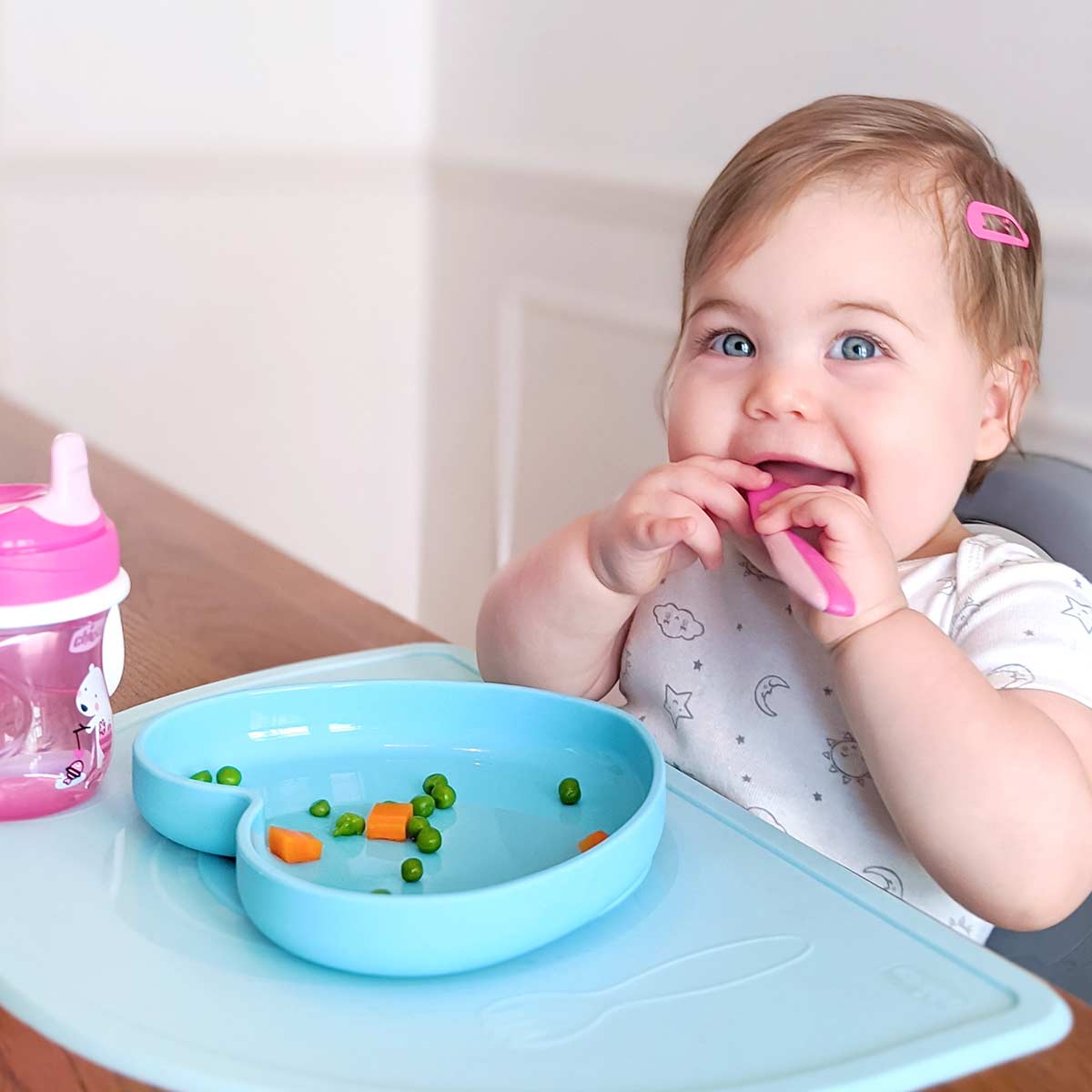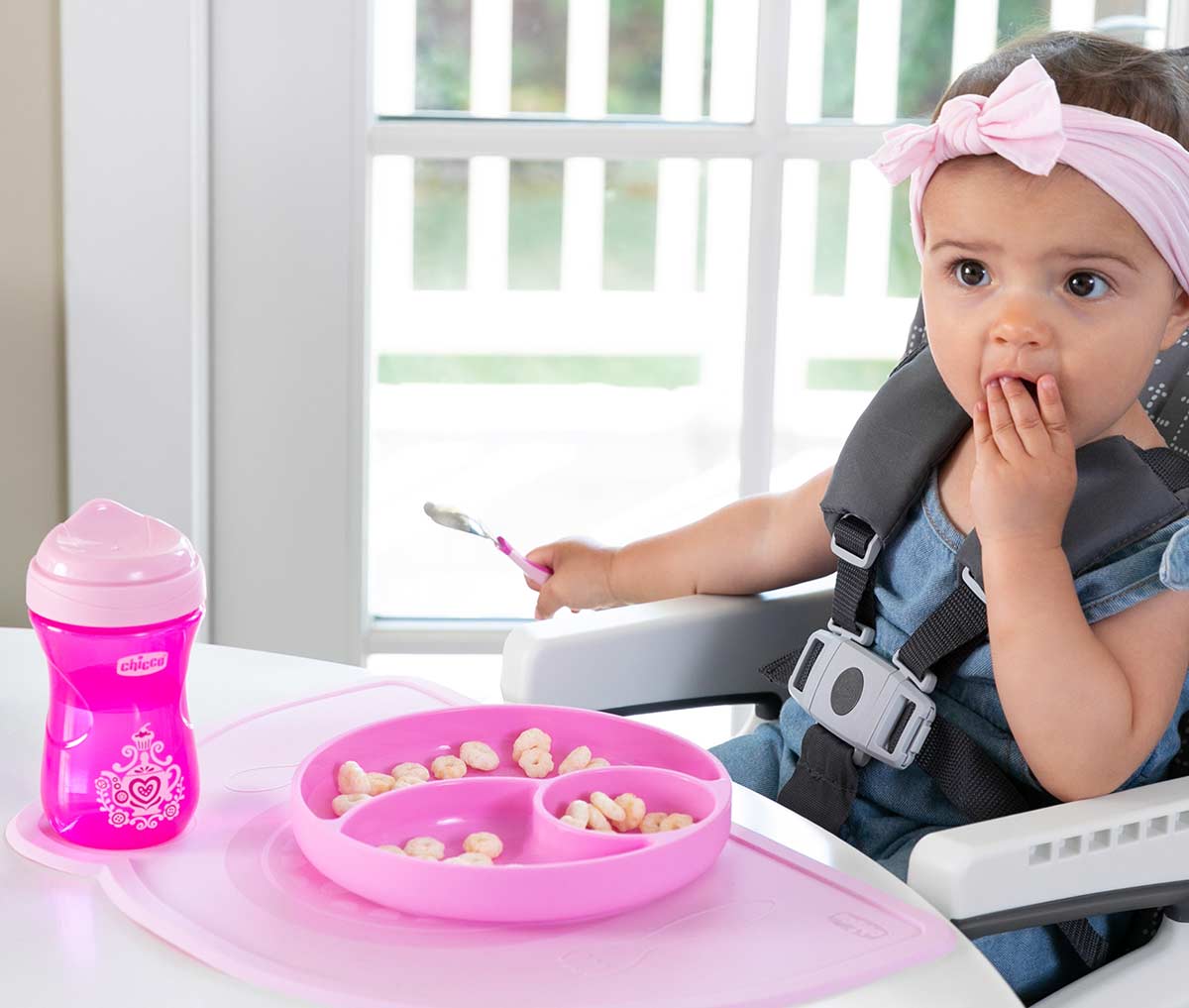
After a few months of bottle or breastfeeding, you're not alone if you're thinking, “when do babies start feeding themselves?”
Developing the ability to feed themselves is a huge milestone for your baby. Self-feeding means your little one is growing up and becoming more independent. As they progress, they hone their fine motor skills and hand-eye coordination while boosting their sense of self-efficacy and autonomy. This time can be a lot of fun for both caregivers and babies as you share the joy of exploring new foods together. Remember, the longer mealtimes and inevitable messes are all part of the process!
No matter what's for dinner, your baby needs direct adult supervision during meals to prevent choking. Getting older children involved in feeding the littlest family member is fun for everyone involved but don't leave them in charge, as they may miss signs of choking. Never leave your baby unattended during mealtime.
Many babies will show interest in self-feeding between 9 and 12 months old. Of course, some will dive in earlier and some a little later, but around this time, most babies can:
- Hold their head up and sit unsupported
- Coordinate their eyes and hands to pick up small objects
- Put things in their mouths
- Swallow food without choking
By 9 to 12 months, your little one likely has some experience with solid foods. If they can sit up unassisted in a high chair or booster seat, regularly grasp food with their whole hand, and attempt to bring food to their mouths for a taste, it's time to start working on the finer points of self-feeding! If you notice your baby try to pick up food with their thumb and forefinger, even better. This important milestone (called the pincer grasp) indicates your baby may be ready to practice holding a spoon and is a surefire sign it's time to embark on the self-feeding journey! Here are a few more signs to watch for:
- Reaching for food that you're eating
- Grabbing the spoon you're feeding them with
- Rejecting the spoon as you try to feed them and trying to feed themselves

Your child will learn and develop at their own pace, but there are many ways you can support and encourage them along the way.
Practice Makes Perfect
As with any skill, practice is vital when it comes to self-feeding. Give your little protege plenty of unhurried time to work on skills like picking up small pieces of food, bringing food to their mouths, and using baby-safe utensils. You can even introduce utensils at mealtime before they begin self-feeding so they can get used to the concept at their own pace. Try having a spoon on hand for each of you during feeding time so they can practice with theirs between the bites you feed them.
Try Pre-Loading a Spoon
If your baby struggles to get the hang of using a spoon, try giving them a little help by loading the spoon with food beforehand and handing it to them. This little taste of success can be encouraging and help them build confidence to try loading a spoon unassisted.
Finger Foods Are Your Friend
Don't get hung up on teaching your little foodie to use utensils. They'll be using chopsticks before you know it! In the meantime, giving your baby plenty of opportunities to feed themselves with their fingers is a great way to help them with the most crucial part of the self-feeding journey, getting food into their tummies!
Be One With The Mess
Expect and prepare for the mess, and don't stress. It's all part of the journey! Be proactive and place an old towel or sheet on the floor, and of course, avoid carpeted areas if you can! Choosing a high chair with an extra large tray and removable tray inserts (like our popular Polly High Chair) gives your little one plenty of room to work with and makes your life a little easier!
Family Mealtime is Learning Time
While it can be tempting (and convenient) to feed your little one separately, try to include them in family meals as much as possible. Eating together is one of the most fundamental parts of the human experience, and your baby will learn a LOT by watching and mimicking the mealtime behaviors of their loved ones. Try using the Chicco Fast Lock 360 hook-on chair to give your baby the perfect seat at the table (right next to you).
Let Your Little Diner Set The Pace and Quantity at Mealtime
Don't rush your baby or try to force them to eat more than they want to. Good things take time! Studies show that pressure around mealtimes and eating is a leading cause of picky eating down the line. Picky eating can lead to a lifetime of poor dietary variety, resulting in mineral and nutrient deficiencies that can affect development. So just kick back, relax and let your baby lead the way. When they're ready for more, they'll tell you!
Your little taste tester should begin with simple, easy-to-pick-up foods. Here are a few ideas to try:
- Cubed or mashed avocado: Soft and easy to mash and chew (even with just a few teeth), avocado is perfect for little fingers and a good source of healthy fats, vitamins, and minerals.
- Banana bits (or mash): Another soft and easy-chewing favorite that's perfect for little mouths, bananas are a good source of potassium and fiber.
- Soft cheese cubes: Full of flavor and easy on gums, cheese is also a good source of protein, calcium, and vitamin D.
- Yogurt: A delicious source of probiotics, yogurt packs a potent dose of protein and calcium.
- Cooked pasta (cut up if needed): Babies love pasta, and it's fun because it comes in many shapes and styles. Pasta is an excellent source of energy-boosting carbohydrates.
- Cooked diced or mashed vegetables: Think carrots, beets, peas (mashed, of course), squash, or corn. Vegetables are a fantastic source of vitamins, minerals, and fiber; feeding your baby a wide variety helps them expand their palette and develop diverse food preferences.
If you and your little one are just starting (or about to start) on the self-feeding journey, don't worry, you've got this! Be patient, have fun and enjoy watching your baby explore the wonderful world of food and flavors! If you're unsure if your baby is ready, speak with your pediatrician at their next well-visit. When in doubt, always err on the side of caution to avoid choking hazards.
Check out our Baby Talk Blog for more insightful parenting information and tips. From car seat questions to soothing a fussy baby (and much more), we've got you covered!
